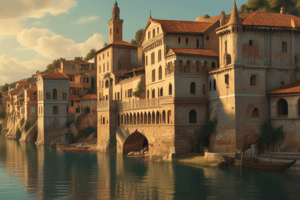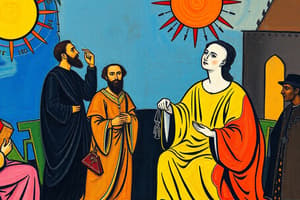Podcast
Questions and Answers
What did humanism revive during the Middle Ages?
What did humanism revive during the Middle Ages?
- The pagan scale of virtues
- The secular and humane philosophy of Greece and Rome (correct)
- The authority of the Scriptures
- The individualism of the later Roman Empire
How did the Church view rampant individualism?
How did the Church view rampant individualism?
- As a positive trait
- As a negative trait (correct)
- As a necessary trait
- As a neutral trait
Who did humanists admire more than Aristotle?
Who did humanists admire more than Aristotle?
- Neoplatonism (correct)
- Cicero
- The Cabala
- The Schoolmen
What did the Church officially ignore?
What did the Church officially ignore?
What did humanism shift rather than dismiss?
What did humanism shift rather than dismiss?
Flashcards are hidden until you start studying
Study Notes
- Humanism was a movement in the Middle Ages that embraced the mystical and aesthetic temper of a pre-scientific age.
- The humanists revered Aristotle less than the Schoolmen did, but worshipped Neoplatonism, the Cabala, and Cicero more.
- They shifted authorities rather than dismissed them.
- Even Aristotle, the greatest of Scholastic authorities, did not lack humanist admirers.
- The first place must indeed be given to the authority of the Scriptures; but, nevertheless, I sometimes find some things said or written by the ancients, nay, even by the heathens, nay, by the poets themselves, so chastely, so holily, and so divinely, that I cannot persuade myself but that, when they wrote them, they were divinely inspired, and perhaps the spirit of Christ diffuses itself farther than we imagine.
- Humanism directly and indirectly revived the pagan scale of virtues.
- The leading intellectual trait of the era was the recovery, to a certain degree, of the secular and humane philosophy of Greece and Rome.
- Another humanist trend which cannot be ignored was the rebirth of individualism, which, developed by Greece and Rome to a remarkable degree, had been suppressed by the rise of a caste system in the later Roman Empire, by the Church and by feudalism in the Middle Ages.
- The Church asserted that rampant individualism was identical with arrogance, rebellion, and sin. Medieval Christianity restricted individual expression, fostered self-abnegation and self-annihilation, and demanded implicit faith and unquestioning obedience. Additionally, the Church officially ignored man and nature.
Studying That Suits You
Use AI to generate personalized quizzes and flashcards to suit your learning preferences.





